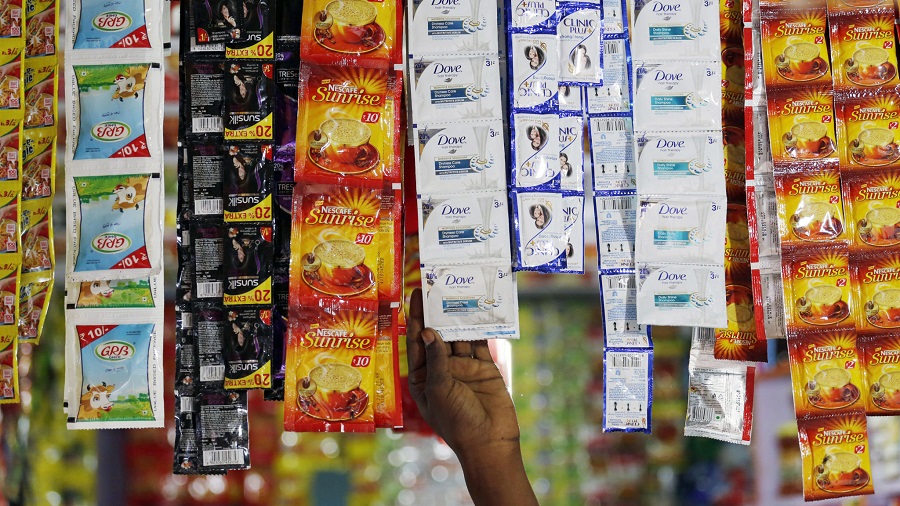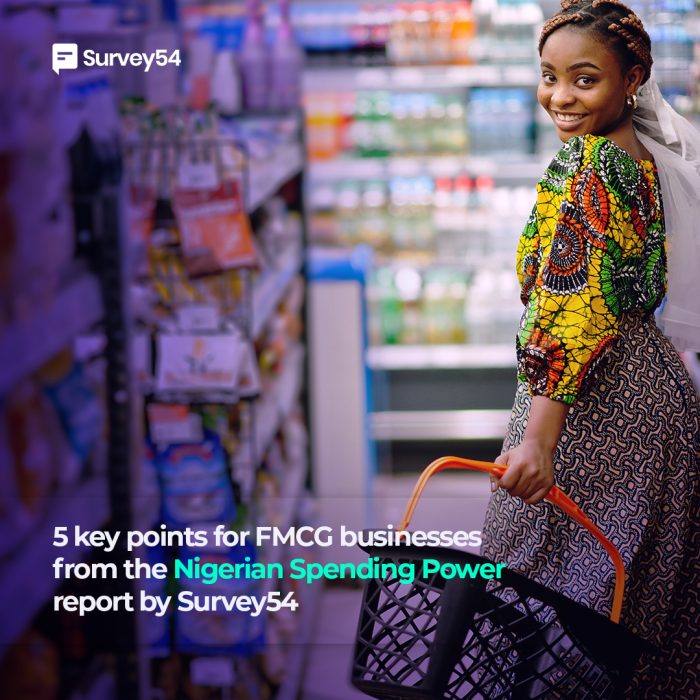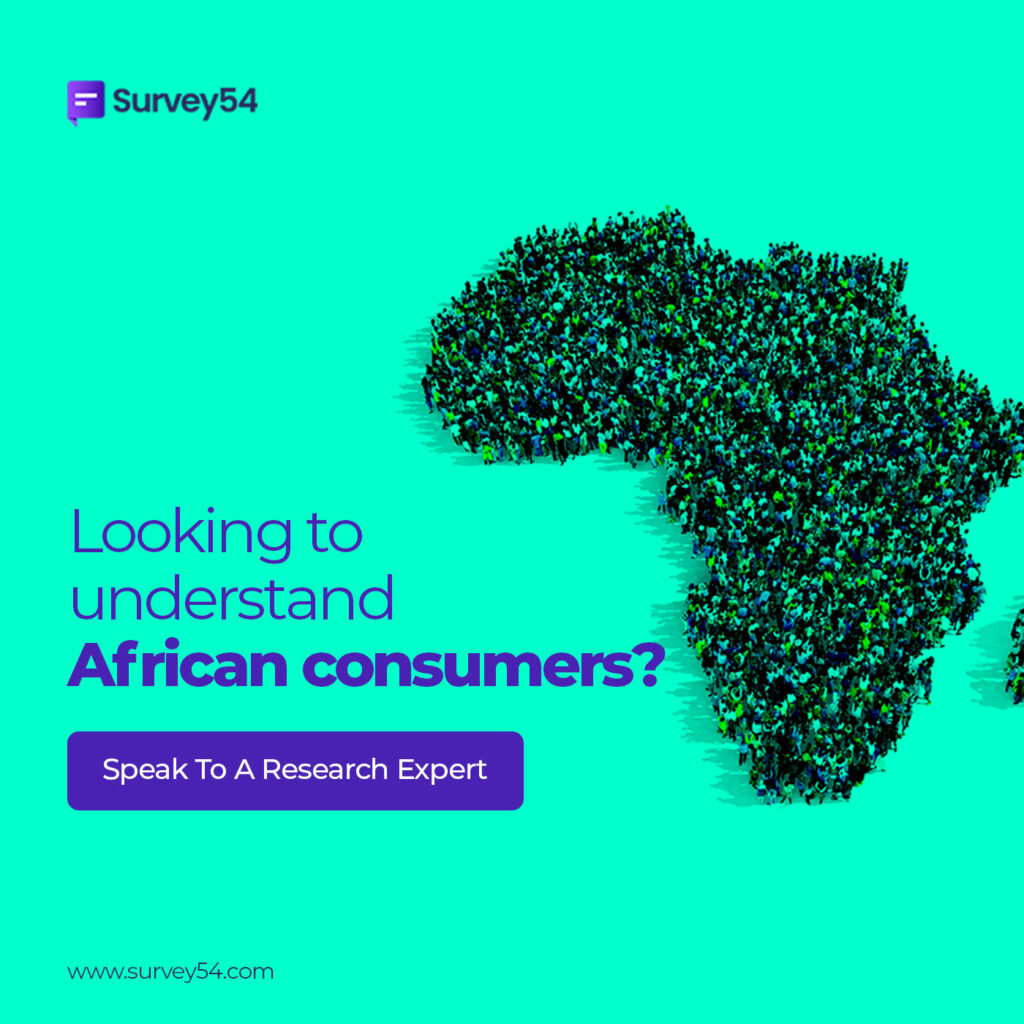
Nigeria, with a population of about 200 million doubles as the 7th most populous country in the world and the most populous black nation. Understanding Nigerian consumer trends is necessary to succeed in the highly competitive, yet, opportunity-filled market.
The Nigerian Spending Power report is particularly important to businesses and investors in the fast-moving consumer goods (FMCG) industry in 2021, as it allows them to make informed investment decisions and maximise the vast Nigerian market.
Download the Nigerian Spending Power report.
Factors ranging from inflation, recession, and the COVID-19 pandemic amongst others have changed the consuming pattern of the about 200 million population of the West-African country; with foodstuff, entertainment, alcoholic beverages, data/airtime and groceries at the top of the list.
Stakeholders in businesses or organisations focused on the country’s market can connect their enterprises to the opportunities created by economic shifts with these key learnings from the report:
1. Customers come first
If the Nigerian Spending Power report reveals anything, it is the fact that customers are royalty and should be treated as such.
With how expensive things are, consumers are only willing to part with their hard-earned cash if they are sure that they will get value for their money.

Image credit: AS Photo Project
Businesses that prioritise changing consumer needs will retain their existing customers as well as win prospectives over.
“Businesses should focus on value-based segmentation within the existing customers and potential customers by providing products and services to fit customers’ needs”
Funlola Ashafa-Oladunjoye,
Marketing Portfolio Manager, Pernod Ricard
2. The preference of essentials over non-essentials
61% of the survey’s respondents believe that their monthly earnings are not enough to cover their needs. According to the report, the wide gap between the income/personal finances of Nigerians and their spending has made them prioritize items considered as essentials over others in their scale of preference.

The report reveals that as the cost of items continues to rise even as the people’s income remains static (reduces in some cases), preferences are given to food items. This was confirmed as 71% of the survey respondents confessed that food is their biggest monthly expense.
Worthy of note also is the fact that Nigerians prefer day-to-day food items like garri, rice over breakfast cereals. About 19% of the respondents with less than NGN50,000 monthly income said that they do not spend up to NGN5,000 on beverages, cereal, and toiletries. However, 17% with the same earning spent up to NGN10,000 on foodstuff.
Download the Nigerian Spending Power report.
3. Pricing has never been as important as now
Although Nigerians want to get value for their money, businesses have to consider pocket-friendly prices for their products and services. The effect of the nationwide lockdown policy to control the spread of the COVIID-19 virus in the country led to the loss of jobs and in some cases, people had to take pay cuts.
The closure of land borders by the Federal government also had its toll on the people, because Nigeria’s economy is highly dependent on importation.
Responding to this economic reality, cereal companies like NASCO, among others in the country have started producing smaller quantities of their products, which are usually in sachets, cheaper, and accessible.

4. The market is becoming more competitive
The Nigerian market is a volatile, vulnerable, and fast-changing one. The Nigerian business landscape is highly competitive, and enterprises that refuse to evolve may lose their customers to more accessible options.
A high number of Nigerians are business owners, as evidenced by 30% of our respondents.
The Nigerian Spending Power Report 2021
Trading Economics equally confirmed this by stating that “by 2020, 81% of Nigerians were self-employed – whether as a main source of income or on the side.”
Despite the harsh economic realities in the country, entrepreneurship is going strong. Nigerians set up these businesses either as a side hustle to augment resources or as their main jobs; competing with the already existing and sometimes bigger players for the same market.
5. Continuous innovation is paramount to business growth
Since the majority of the Nigerian population are youths, businesses must continue innovating to suit contemporary tastes and remain relevant. The ever-changing market requires entrepreneurs and professionals with ideas that keep pace with the consumers.
One example of this is seen in the nation’s entertainment industry taking advantage of the internet as content consumption shifts online. With the effect of the nationwide lockdown policy to curb the spread of the coronavirus, cinemas were closed and concerts cancelled, but entertainers didn’t fail to serve their audience as they went digital.

Confirming this about the report concerning the Nigerian market, Rukevwe Toka (Regional HI Manager (Africa) for Digital Transformation, Shopper Marketing & Commercial Strategy at the Coca-Cola Company), commented: “Nigerian businesses just need to keep innovating to make their product and services convenient for consumers to buy. Convenient in terms of prices, convenient in terms of availability and accessibility, convenient in terms of salience as well”.
Download the Nigerian Spending Power report.
TLDR:

“Businesses need to ensure value for money is their key proposition”.
Dorcas Osikorobia,
Chief Marketing Officer, Mode Media
The Nigerian Spending Power report confirms that Nigerians spend more on foodstuff, entertainment, alcoholic beverages, airtime/data, and groceries in 2021 than they did in 2020.
The harsh effect of the COVID-19 pandemic is still visible in the nation’s economy. Therefore, FMCG businesses have to leverage the need for essentials especially food items and groceries. As competition and lower-cost alternatives flood the market, it’s imperative for companies to prioritize customer value for money.
Download the Nigerian Spending Power report.


